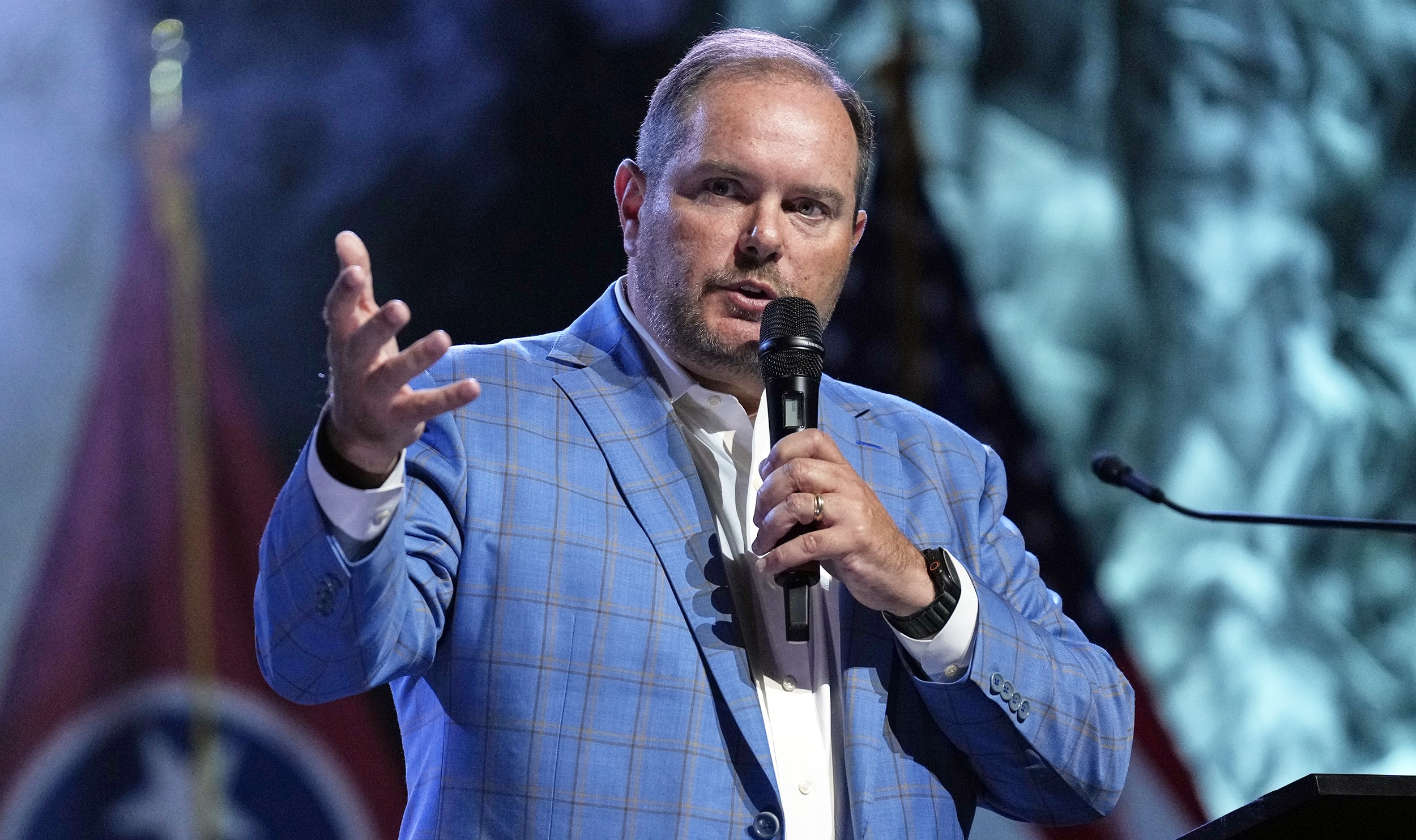The Dictatorship
We need to talk about why Josh Shapiro’s home was set on fire

On Saturday night, on the first night of Passover, an armed intruder hopped a gate at the residence of Pennsylvania’s Gov. Josh Shapiro and set fire to the building. It appears he did so because Shapiro is Jewish.
According to call logs provided by Dauphin County authorities, Cody Balmer told a 911 dispatcher less than two hours after he allegedly set the fire that “Shapiro needs to know that he ‘will not take part in his plans for what he wants to do to the Palestinian people,’ and he needs to stop ‘having my friends killed’ and ‘our people have been put through too much by that monster.’”
Shapiro, of course, has no control over Israel’s war in Gazaand accusing him of culpability for crimes committed by other Jews, halfway around the world, is the definition of antisemitism.
Few would consider this even a controversial statement. But here’s one that might ruffle a few feathers.
Balmer’s particular pro-Palestinian rhetoric didn’t simply appear out of thin air.
Targeting Shapiro because he’s Jewish is disturbingly similar to certain pro-Palestinian activists calling Shapiro “Genocide Josh” last summer and advocating against him as Kamala Harris’ running mate. It’s little different from anti-Zionist activists targeting Jewish-run businesses in the U.S., Jewish American leaders and Jewish institutions because of their views on Israel.
They are two sides of the same coin — manifestations of modern antisemitism.
It is essential to note that there are caveats to this argument. Anti-Zionist activists didn’t burn Shapiro’s house and try to kill him. Degree matters — as do actions. Moreover, Balmer, according to his mother, suffers from profound mental illness and has a lengthy criminal record.
Still, Balmer’s particular pro-Palestinian rhetoric didn’t simply appear out of thin air. His specific criticisms of Shapiro bear striking similarity to accusations made by anti-Zionist activists that the governor is aiding and abetting genocide in Gaza.

Last summer, critics of Shapiro’s bid to be Harris’ running mate argued that he “stands out among the current field of potential running mates as being egregiously bad on Palestine.” A group of progressive activists calling themselves “No Genocide Josh” urged Democrats to pass over Shapiro for the No. 2 nod. A now-defunct website of the group argued that it was in the Democratic Party’s “best interests” that the VP nominee “support the majority of Democrats and Americans who want social and economic justice for workers and an immediate ceasefire in Palestine.”
But Shapiro’s views are practically interchangeable with those of other prominent Democrats, including his rivals to become Harris’ 2024 running mate.
Like the eventual VP pick, Minnesota Gov. Tim Walz, or Arizona Sen. Mark Kelly, Shapiro supports a two-state solution and the creation of a Palestinian state. He has also been far more personally critical of Israeli Prime Minister Benjamin Netanyahu, whom he called “one of the worst leaders of all time” and said of him he “has steered Israel in a wrong direction, and made Israel less safe and made their future less bright because of his leadership.” (For Kelly’s part, he attended and applauded Netanyahu’s speech to Congress last year when many other Democrats in attendance wouldn’t, while Walz barely mentioned the prime minister’s name during his time as the Democrats’ VP candidate.) Yet, no one called Walz “Genocide Tim” or Kelly “War Crimes Mark.”
Shapiro has even offered rhetorical support to those protesting Israel’s policies in Gaza, noting “it’s right for young people to righteously protest and question those issues.”
Underlying the criticisms of Shapiro is the unstated idea that Jews cannot be objective when it comes to Israel — a charge once explicitly lobbied against Catholic politicians, including John F. Kennedy — or that American Jews are as loyal to Israel as they are to the United States.
The suggestion of dual loyalty has haunted Jews for generations, but such scurrilous accusations from self-proclaimed progressives are all the more concerning. The left has long partnered with Diaspora Jews in fighting racial, ethnic and religious discrimination. At a time when the president of the United States regularly traffics in antisemitic tropes — and his first term in office was marked by a significant rise in antisemitic incidents — the support of the left is more essential than ever. (Even with Trump out of office, the number of antisemitic incidents in America continued to riseeven before the war in Gaza began in late 2023.)
Criticism of Israel is fair game, but lumping in American Jews with the actions of their co-religionists in Israel is not.
To those rightly rushing to condemn Balmer’s alleged crime, the same unequivocal force needs to be directed at those who traffic in the seemingly more benign but just as dangerous antisemitism — even when it comes from their own political camp. Conservatives like to ascribe blame for antisemitism to the anti-Zionist left. Liberals often place blame squarely at the feet of Trump and other far-right groups. The reality is that antisemitism is prevalent in both camps, even if both right and left-wing leaders are loath to point fingers at their political allies.
Antisemitism is arguably the oldest and most enduring form of ethnic and religious discrimination. It is civilization’s first major conspiracy theory. Since antisemitism is so prevalent and often misunderstood, there is an even greater danger in singling out Jewish politicians for their views on Israel or Jewish administrators at public universitiesor protesting Jewish restaurants, hospitals with Jewish names, or Jewish places of worshipand calling for bans on Jewish religious organizations, like Hillel. Doing so risks turning Jews at large into targets of those aggrieved by the situation in Gaza.
Pro-Palestinian activists will argue that such public demonstrations represent a small fringe, but that’s all the more reason to ostracize and exclude those who would turn their attacks on Israel against Jews in America. Jews need and deserve not nitpicking over what is and isn’t antisemitism, but rather full-throated condemnation, even if the hate is emerging from one’s own political camp.
Criticism of Israel is fair game, but lumping in American Jews with the actions of their co-religionists in Israel is not. As we saw this week in Pennsylvania, when such ideas enter the public discourse, the impact can be deadly.
Michael A. Cohen is a columnist for BLN and a senior fellow and co-director of the Afghanistan Assumptions Project at the Center for Strategic Studies at the Fletcher School, Tufts University. He writes the political newsletter Truth and Consequences. He has been a columnist at The Boston Globe, The Guardian and Foreign Policy, and he is the author of three books, the most recent being“Clear and Present Safety: The World Has Never Been Better and Why That Matters to Americans.”
The Dictatorship
MAGA world’s violent pregnancy-related rhetoric is on full display

Conservatives’ crusade against reproductive freedom is deathly serious. Two controversies over the past week highlight some of the violence undergirding the MAGA movement’s assault on the idea of people choosing when and whether to bear children.
In Tennessee, two GOP state lawmakers are gauging interest in legislation that would make people eligible for homicide charges — and potentially the death penalty — for receiving or assisting with an abortion.
The bill’s co-sponsor in the state Senate said he doesn’t think the bill currently has the votes but ultimately could. Per the WSMV television station in Nashville:
“We want to be very open and have a conversation, whether it’s controversial or not — let’s hear from all sides to see where we are as Tennessee and where we stand,”[stateSenMark[stateSenMark] Pody said. “Talking to some colleagues, we don’t have the votes to move something like that in the Senate at this moment.”
Pody said he does not consider the bill dead on arrival in the Senate, adding he believes there is a possibility for negotiation and that Republicans in the House and Senate could reach an agreement on language that could pass both chambers.
Most Americans seem to think we shouldn’t kick the tires on state-sponsored executions for abortion recipients. Pody apparently disagrees.
His fellow co-sponsor in the House, state Rep. Jody Barrett, didn’t sound any more sane in his exchanges about the bill with reporter Chris Davis from WTVF, the CBS affiliate in Nashville.
“Murder should be murder, whether it’s a person in being or a person in utero,” Barrett said.
I asked Barrett directly about the criticism that the bill unfairly targets mothers.
“I think that’s a talking point saying that you’re targeting mothers. We’re not targeting mothers. We’re targeting unborn children and trying to protect them and give them the protection under the law for you and me,” Barrett said.
The tacit admission came later:
“A simple examination of the death penalty in Tennessee would show that that’s just not realistic. Now, do I have to admit that the death penalty is a possibility? Sure. But since the death penalty was reinstated in Tennessee in 1977, there’s been less than 200 people sentenced to death, and only 16 have actually been executed — none of them women,” Barrett said.
It’s safe to say the latter remarks are probably not going to be enough to soothe concerns about this morbid proposal — one that mirrors several others across the country in the past year.
In Vermont, a different controversy is unfolding over a right-wing influencer named Hank Poitras, who was elected chairman of a county GOP committee — and who once delivered an extremely graphic diatribe about committing an act of violence on a woman’s womb after she got pregnant.
Ja’han Jones is an MS NOW opinion blogger. He previously wrote The ReidOut Blog.
The Dictatorship
Trump administration pauses Medicaid funding to Minnesota

The Trump administration is temporarily halting $259 million in Medicaid funding to Minnesota, Vice President JD Vance announced Wednesday.
Vance said the payments will be paused “until the state government takes its obligations seriously to stop the fraud that’s being perpetrated against the American taxpayer.”
The news of the temporary halting of the massive amount of federal funding — which provides health insurance to low-income people — comes as the state has been a target of the federal government following allegations of fraud perpetrated by child care providers in the state. In December, federal officials froze $185 million in child care funds to Minnesota, and last month, the administration announced it was freezing $10 billion in funding for social services programs in five Democratic-led states, including Minnesota.
The latest news also follows President Donald Trump’s announcement at the State of the Union address Tuesday night that he was tasking the vice president with waging a “war on fraud.”
Dr. Mehmet Oz, administrator for the Centers for Medicare and Medicaid Services, said Wednesday that officials identified “scammers” who he claimed “hijacked … a certain part of the Minnesota Medicaid system.”
Federal prosecutors have confirmedthere was large-scale social services fraud in Minnesota, with dozensof people — many of whom are Somalis — having been convicted of stealing more than $1 billion in public funds intended for food, housing and services for people with disabilities. But the administration did not provide detailed evidence on Wednesday of the alleged large-scale Medicaid fraud in Minnesota that Oz claimed.
“These schemes disproportionately involve immigrant communities,” Oz said. Generally, undocumented people are not able to be enrolled in Medicaid.
Vance mentioned a program that he said claimed to offer after-school services to autistic children but did not actually do so, though he did not offer any identifying information.
Oz added that the top fraudulent biller in the state “submitted 450 days where they claim they were working more than 24 hours a day,” but also did not provide corroborating information.
According to the health policy research organization KFF, Medicaid covers nearly 1.2 millionkids and adults in Minnesota, more than half of whom are nursing home residents. More than three-quarters of Medicaid enrollees in the state are working full time, that data also shows.
Oz said the federal government will only release the funds “after they propose an act on a comprehensive corrective action plan to solve the problem,” adding that Gov. Tim Walz, D-Minn., has 60 days to do so. He suggested similar announcements to come in other states “soon,” and mentioned Florida, New York and California as potential future targets.
“This is not a problem with the people of Minnesota,” Oz said. “It’s a problem with the leadership of Minnesota and other states who do not take Medicaid preservation seriously.”
Vance added: “The main reason that we’re doing this is that we want to make sure that the people of Minnesota have access to the services that they’re entitled to.”
In a post on X on Wednesday night, Walz said the announcement “has nothing to do with fraud,” and added, “The agents Trump allegedly sent to investigate fraud are shooting protesters and arresting children. His DOJ is gutting the U.S. Attorney’s Office and crippling their ability to prosecute fraud. And every week, Trump pardons another fraudster.”
Minnesota lawmakers and the state’s attorney general, Keith Ellison, have introduced legislation that would add more than a dozen new staffers to the AG office’s Medicaid Fraud Control Unit and that would strengthen state fraud laws.
In a statement provided to MS NOW, Ellison hinted the state may sue in response.
“Courts have repeatedly found that their pattern of cutting first and asking questions later is illegal, and if the federal government is unlawfully withholding money meant for the 1.2 million low-income Minnesotans on Medicaid, we will see them in court,” he said.
Shireen Gandhi, commissioner of the Minnesota Department of Human Services, which administers Medicaid, said the government’s actions “significantly harm the state’s health care infrastructure and the 1.2 million Minnesotans who depend on Medicaid,” adding that federal officials “chose to ignore more than a year of serious and intensive work to fight fraud in our state.”
Spokespeople for Sen. Tina Smith, D-Minn., and Sen. Amy Klobuchar, D-Minn., did not immediately respond to MS NOW’s request for comment.
Nour Longi and Emily Hung contributed reporting.
Julianne McShane is a breaking news reporter for MS NOW who also covers the politics of abortion and reproductive rights. You can send her tips from a non-work device on Signal at jmcshane.19 or follow her on X or Bluesky.
The Dictatorship
Trump says he’s ‘won affordability.’ The data shows a different story.
ByJosh Bivens
President Donald Trump has said some strikingly out-of-touch things about affordability: that it’s a “hoax,” he’s “solved it” and he’s “won affordability.” In his State of the Union address, he even said “prices are plummeting downward.” U.S. families know this is nonsense. But to see how much Trump’s policies will erode affordability in the coming years, you must understand that affordability isn’t just about prices.
Affordability is the outcome of a race between incomes and prices. And for typical families, the Trump agenda is near-guaranteed to harm their incomes far more than it can possibly reduce their prices.
For typical families, the Trump agenda is near-guaranteed to harm their incomes far more than it can possibly reduce their prices.
Even judged by the movement of prices alone, Trump’s record on affordability is poor. Inflation fell from 8.0% to 3.0% in the final two years of the Biden administration. This rapid downward movement slowed to a crawl in the first year of Trump’s second term, with inflation falling from 3.0% to just over 2.6%.
There are clear policy reasons why progress in reducing inflation has slowed. Electricity prices have surged as the Trump administration has ended subsidies for renewable generation passed during the Biden administration. The Trump tax cuts passed in the president’s first term were part of a law that gouged loopholes in the tax code, including inviting pharmaceutical companies to offshore their production and import back into the United States. Last year the Trump administration put tariffs on these offshored pharmaceuticals, pushing up their costs. When the administration failed to extend Obamacare subsidies for people buying health insurance through the exchanges, healthier enrollees who could afford to began opting out, driving up prices for everybody left in the Affordable Care Act marketplace.
And these are not the only ways that Trump administration policies have intensified affordability issues for ordinary Americans.

That failure to extend Obamacare subsidies did more than lead to higher market prices for exchange insurance plans. It also siphoned income away from families that could have been used to defray the cost of buying health insurance. Instead, out-of-pocket burdens spiked. Even bigger harm looms for more vulnerable families as the Republican tax and spending megabill, known as Trump’s One Big Beautiful Bill Act, is poised to cut Medicaid and food stamps by more than $1 trillion over the next decade. These cuts effectively remove income from the pockets of the most vulnerable. This explains why the bill reduced affordability for the bottom 40% of families in this country.
It is hard to make a bunch of changes to the nation’s tax and spending laws that add $4 trillion to the nation’s debt and still somehow manage to make 40% of the population worse off. If you’re borrowing it all anyhow, why not at least give something to the worst-off among us?

Finally, even as inflation fell slightly in 2025, wage growth adjusted for inflation (or real wages) also slowed. For the lowest-wage workers, these real wages actually declined. The reason is simple: The labor market cooled in 2025. This was no accident. The administration’s federal workforce cuts, deportation agenda and the chaos of the Trump tariff policy and approach to the Federal Reserve all contributed to labor market sluggishness. And workers in the bottom half of the wage distribution need sustained and very low unemployment rates to gain any leverage with employers when they ask for higher wages. They had this leverage early in the post-pandemic recovery, but it’s been lost. The labor market would have cooled even faster in 2025 had there not been a ramp-up in spending associated with the frenzied buildout of artificial intelligence firms and the related stock market boom (which could still prove to be a bubble).
With all that in mind about the scale of Trump policies’ negative impact on affordability, now let’s consider what genuine wins in affordability would look like.
A chief place to start: attacks on the influence that has most harmed U.S. families’ affordability in recent decades — the rise in inequality that has funneled income away from the bottom and middle toward the top. This expansion in inequality was policy-generatedso it can be reversed by different policy choices. Yet the Trump administration has doubled down on strategies that have increased inequality by hamstringing workers’ rights to organize unions and bargain collectively and rolling back important labor standards, such as minimum wages. (If you want more examples, my Economic Policy Institute colleagues and I identified 47 ways Trump has made life less affordable for Americans over the past year.)
The first step in a good-faith affordability agenda would be restoring the Medicaid and SNAP funds cut in the One Big Beautiful Bill Act.
The first step in a good-faith affordability agenda would be restoring the Medicaid and Supplemental Nutrition Assistance Program funds cut in the One Big Beautiful Bill Act. The obvious way to pay for this restoration? By sharply raising taxes on the ultra-rich.
Besides being a key source of revenue to pay for affordability-enhancing measures such as Medicaid and food stamps, raising taxes on the ultra-rich would lower pre-tax inequality. Essentially, these higher taxes would blunt the incentive for the ultra-rich to rig the rules of the economy in order to claim as much income as they can at the expense of typical families. This strategy works — across time and across countries there is ample evidence that higher taxes on the rich keep pre-tax inequality in check.
The economic struggles of typical U.S. families deserve serious solutions, not political buzzwords. Unfortunately, the policies the Trump administration has undertaken are making Americans’ economic struggles harder, not easier.
Josh Bivens
Josh Bivens is the chief economist at the Economic Policy Institute.
-

 The Dictatorship1 year ago
The Dictatorship1 year agoLuigi Mangione acknowledges public support in first official statement since arrest
-

 Politics1 year ago
Politics1 year agoFormer ‘Squad’ members launching ‘Bowman and Bush’ YouTube show
-

 The Dictatorship6 months ago
The Dictatorship6 months agoMike Johnson sums up the GOP’s arrogant position on military occupation with two words
-

 Politics1 year ago
Politics1 year agoBlue Light News’s Editorial Director Ryan Hutchins speaks at Blue Light News’s 2025 Governors Summit
-

 Politics1 year ago
Politics1 year agoFormer Kentucky AG Daniel Cameron launches Senate bid
-

 The Dictatorship1 year ago
The Dictatorship1 year agoPete Hegseth’s tenure at the Pentagon goes from bad to worse
-
Uncategorized1 year ago
Bob Good to step down as Freedom Caucus chair this week
-

 Politics10 months ago
Politics10 months agoDemocrat challenging Joni Ernst: I want to ‘tear down’ party, ‘build it back up’




